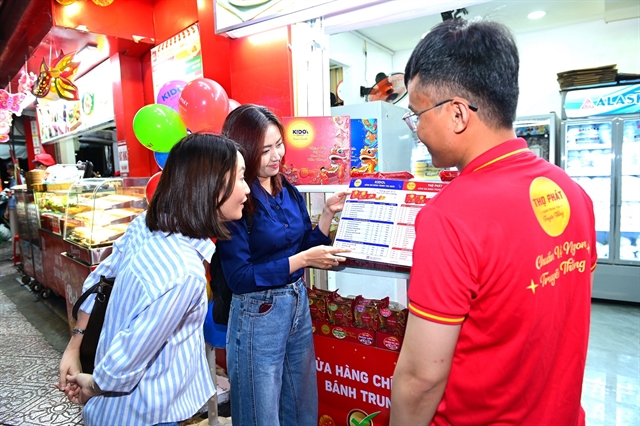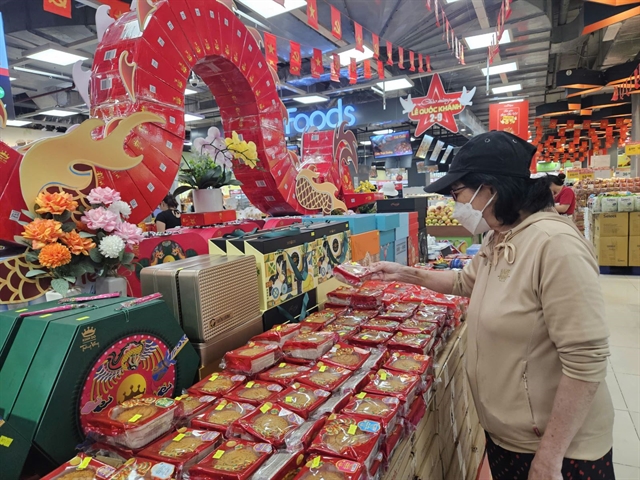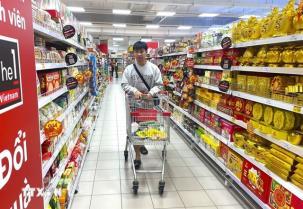This year, the spotlight is on health, sustainability, and food safety as consumers embrace a “green” trend while turning away from unregulated homemade products.

HCM CITY — The Mid-Autumn Festival is once again filling HCM City’s streets with colourful mooncake stalls and festive cheer.
But this year, the spotlight is on health, sustainability, and food safety as consumers embrace a “green” trend while turning away from unregulated homemade products.
By mid-September, the Mid-Autumn spirit had already swept across HCM City.
On major streets such as Hùng Vương, Hồng Bàng, Quang Trung, and Phạm Văn Đồng, colourful mooncake stalls appeared early, drawing in crowds of shoppers.
Well-known brands like Kinh Đô, Như Lan, Bibica, Đồng Khánh, Brodard, and Givral, along with five-star hotels, simultaneously rolled out new collections, creating a vibrant and competitive market.
Prices range from VNĐ45,000 (US$1.71) per cake to premium gift sets worth millions, catering to a wide variety of consumers.
But beyond the product diversity, consumer trends are clearly shifting. Health-conscious buyers are increasingly choosing mooncakes with less sugar, natural ingredients, and eco-friendly packaging.
“My family has elderly members, so we always go for low-sugar cakes with nut or green tea fillings. They’re delicious and healthy,” said Ngọc Hà from Bình Thạnh Ward.
Supermarket surveys confirm a notable rise in demand for these products.
Food industry expert Nguyễn Minh Ngọc noted: “Sales are expected to climb this year as the economy recovers. More importantly, businesses have been quick to adapt, from cutting sugar and oil to adopting green packaging. This is driving sustainable market growth.”
According to Trần Thị Hiền Minh, vice president of the Sài Gòn Professional Chefs Association, customers now demand greater transparency on ingredient origins, labelling, food safety certification, and environmental sustainability.
“This is not just a passing trend,” she said. “It’s becoming a long-term competitive edge for businesses.”
Clearly, consumer tastes have shifted from “tasty and visually appealing” to “healthy and safe.”
The change reflects an urban lifestyle that values health and social responsibility, pushing brands to keep innovating to stay relevant.

“Homemade” mooncakes
While major companies compete in product innovation and packaging, unregulated “homemade” mooncakes have carved out a niche on social media and e-commerce platforms.
Videos showcasing baking processes, molten fillings, and personalised gift boxes have attracted hundreds of thousands of views. Their handmade charm and novelty appeal particularly to younger consumers eager to try something unique.
However, safety concerns are mounting.
“Last year I bought handmade mooncakes because they were advertised as ‘preservative-free.’ But after just two days, they grew mouldy. Worried about my child’s health, this year I only buy cakes with clear labels and expiry dates,” said Thu Hằng from Long Trường Ward.
Sellers are also becoming more cautious. A mooncake baker from Thạnh Mỹ Tây, who once sold hundreds of cakes each season on Facebook, now limits sales to acquaintances.
“Ingredients come from various sources, some with invoices, some from markets, so origins can’t always be verified. Small-scale production often fails to meet food safety regulations,” she admitted.
“Homemade cakes for personal consumption are one thing. But once sold on the market, they must comply with regulations such as health checks, ingredient traceability, and hygiene standards,” stressed Phạm Khánh Phong Lan, director of the HCM City Food Safety Management Authority. “Small-scale production is no excuse to avoid inspection. Selling food based solely on trust is very dangerous.”
Nguyễn Thị Hồng Minh, chairwoman of the Transparent Food Association, warned: “Consumers often assume homemade cakes are safer because they use fewer chemicals. But without proper oversight, the risks actually increase. Microbial contamination can be higher than in industrial products if food safety knowledge is lacking.”
In reality, many homemade mooncakes are sold entirely through private messages and bank transfers, with no invoices or production site details.
Some small shops exploit seasonal demand, lack proper storage facilities, and risk cross-contamination. When problems occur, accountability is nearly impossible.
Authorities urge consumers to stay vigilant, buying only products with clear labels, reasonable expiry dates, and safety certifications, and avoiding those with unusually low prices or unclear packaging.
Sellers, even small-scale ones, must meet minimum standards to ensure safety and build long-term credibility. — VNS



